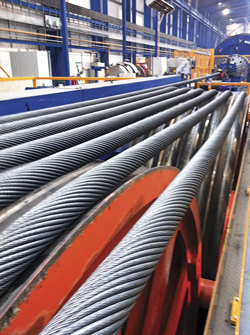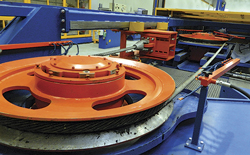|
Bridon’s rope production dates back to the 18th century, when it made ropes from natural fibers, such as jute. Now the company manufactures steel wire and synthetic ropes, including high-strength ropes for offshore heavy lifting and deepwater mooring. While the company has a strong UK manufacturing base, it operates a total of 11 manufacturing units worldwide, including Germany, U.S., Indonesia and China. Since its acquisition in 2008 by Melrose PLC, the company has embarked on a capex investment of more than $66 million for the development of the world’s most advanced ropes.
 |
| Fig. 1. Bridon’s plant in Neptune Quay can manufacture multi-strand rope in rope diameters up to 250 mm and rope weights up to 600 tonnes. |
|
Bridon invested $9 million in the wiremill facility at Doncaster, England, where raw steel is drawn into high-specification wire. Wires are first twisted into strands, and then, strands are twisted into multi-strand ropes. Late last year, Bridon opened its multi-strand rope factory at Neptune Quay, with an investment of over $45 million, Fig. 1. A unique feature of the Neptune Quay facility is that wire rope reels, weighing as much as 650 ton, can be hoisted directly onto a barge.
 |
| Fig. 2. The Bridon Technology Centre includes a high-capacity bend fatigue testing tool that is capable of testing ropes ranging in diameter from 20 to 100 mm and a maximum load of 160 tonnes. |
|
In February 2013, the company inaugurated its Bridon Technology Centre (BTC) in Doncaster after a capital investment of $7.53 million, Fig. 2. The BTC includes a metallurgical laboratory and testing capabilities to evaluate both fiber and steel wire ropes. The BTC has the capability to test samples from ropes that weigh hundreds of tonnes, assessing their strength under extreme loads, endurance against bend fatigue, rotational characteristics and their response to repeated layering on spools. The metallurgy lab includes a 3D microscope, to examine ropes in minute detail.
Bridon is working with customers on selected technical projects, including wire ropes with low and no rotation characteristics. “The holy grail of rope technology is a hybrid rope that combines the benefits of steel wire and synthetic fiber ropes to push beyond the current boundaries of length, strength and weight,” explained Dr. Chris Newton, Bridon’s Group technical director. 
|




